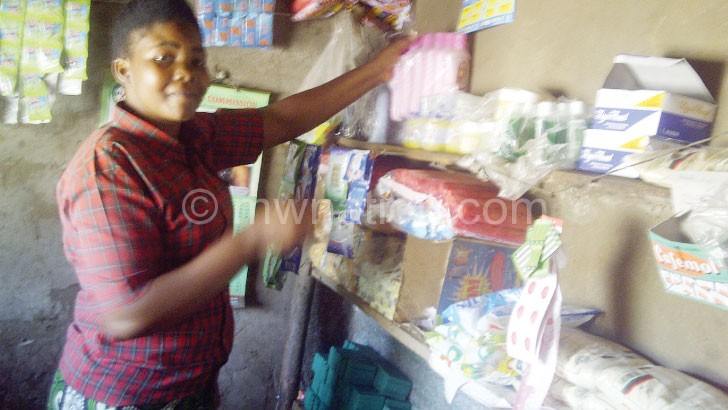Rural women turning economic tables around
With just K200 that she invested in a village savings loan (VSL) group, 49-year-old Belinda Mickson has transformed her life.
Married with six children, Mickson comes from Chilundu Village, Traditional Authority (T/A) Mwanza in Salima.

“After doing some piecework, I decided to take K200 from my earnings and join a VSL group called Msekese in my village. I bought only two shares at K100 each,” explains Mickson.
She joined a 25-member Msekese VSL group—comprising 20 women and five men—on February 8, 2015. Msekese is one of the groups that Women’s Legal Resources Centre (Wolrec) established in Salima and Balaka under a project known as Promoting Women’s Socio-Economic Empowerment (Prowese) with funding from IM Swedish Development Partner.
Mickson says after doing another piecework she saved K3 500 in the group by April 2015, which enabled her to access a loan worth K7 000 from her VSL with a maximum repayment period of three months.
“I invested the money into selling banana fritters and thobwa (sweet beer) and was making average profit of K5 000 on every K7 000 I invested. After I repaid the loan, I accessed two other loans worth K15 000 and K20 000 in May and June, 2015, respectively. I bought two female piglets at K25 000 and expanded capital for my business,” Mickson says proudly.
She explains that she used K10 000 to buy groundnuts from farmers and re-sell to a market she had already identified —vendors. She says with the profits gained from her business, she managed to buy another male piglet, in early July. She says currently she has three piglets, but is still running her diversified business of selling groundnuts, fritters and thobwa which enables her to meet basic needs.
“Piggery farming is one of the most profitable businesses because a piglet normally costs about K15 000 while a big pig can fetch as high as K50 000. I want to further venture into tobacco and groundnuts cultivation as the two crops are in huge demand and fetch high prices on the market,” explains Mickson while adding that she easily pays student contribution fee at school, buys school uniform for her children and supports her husband in accessing basic needs such as food and clothing, which was not the case before she joined the VSL group.
Another woman, from Balaka, Martha Luka aged 38 also has a similar story. Married with four children, Luka comes from Magombo Village, group village head Magombera in T/A Chanthunya. She says she started a grocery business in 2011 with a capital of K12 000 after she cultivated and sold cotton. She, however, says the grocery business was not expanding.
“Since I started the grocery business in 2011, I have been out of business three times because I was taking the capital out of the business to buy basics for the home and I was failing to revamp the business until I joined a VSL group established by Wolrec in January 2015,” she says.
“Before joining the VSL, my business capital after four years was only K60 000. Currently, my capital is K150 000. I sell different items such as washing and bathing soap, body lotion, sugar, salt, cooking oil, among others. I also stock dried fish at the shop,” explains Luka.
Luka says she no longer worries about the sustainability of her business because she is making enough money to meet basic needs of her family without having to eat into the business capital.
“From the profits of the business, I am able to support my late sister’s three children with school fees apart from my own children, and paying for casual workers in the maize and cotton field,” explains Luka.
These are just a few stories of some women in rural areas who have been given the skills and confidence to venture into income generating activities (IGAs) by Wolrec. The organisation trains the women in VSL operations, business and marketing skills and gender and human rights, among others. With funding from IM Swedish Development Partner, the organisation also provides capital that revolves around project participants in Salima and Balaka.
This year’s International Women’s Day which was commemorated yesterday under the theme ‘Planet 50-50 by 2030: Step It Up for Gender Equality’ calls for the need to empower women to help them make economic strides and allow them access to education without gender disparities.
The 17 Sustainable Development Goals (SDGs) that countries adopted in September last year are aimed at ending poverty, protecting the planet, and ensuring prosperity for everybody over the next 15 years. Women empowerment falls under Goal Number Five which is to achieve gender equality and empower all women and girls.
Malawi failed to attain Goal Number 3 of the Millennium Development Goals (MDGs) which was targeted at promoting gender equality and empowering women by 2015.
Having the new SDGs in place could be a second chance for government, civil society organisations (CSOs) that are concerned with development and ordinary Malawians to reflect on where Malawi went wrong during the MDGs implementation years and build on the successes and learn from the challenges and adopt strategies that will ensure that Malawi attains all the 17 goals by 2030. n





